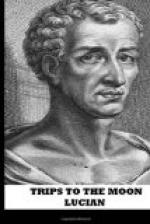Criticism is twofold: that which teaches us what we are to choose, and that which teaches us what to avoid. We will begin with the last, and consider what those faults are which a writer of history should be free from; next, what it is that will lead him into the right path, how he should begin, what order and method he should observe, what he should pass over in silence, and what he should dwell upon, how things may be best illustrated and connected. Of these, and such as these, we will speak hereafter; in the meantime let us point out the faults which bad writers are most generally guilty of, the blunders which they commit in language, composition, and sentiment, with many other marks of ignorance, which it would be tedious to enumerate, and belong not to our present argument. The principal faults, as I observed to you, are in the language and composition.
You will find on examination, that history in general has a great many of this kind, which, if you listen to them all, you will be sufficiently convinced of; and for this purpose it may not be unseasonable to recollect some of them by way of example. And the first that I shall mention is that intolerable custom which most of them have of omitting facts, and dwelling for ever on the praises of their generals and commanders, extolling to the skies their own leaders, and degrading beyond measure those of their enemies, not knowing how much history differs from panegyric, that there is a great wall between them, or that, to use a musical phrase, they are a double octave {24a} distant from each other; the sole business of the panegyrist is, at all events and by every means, to extol and delight the object of his praise, and it little concerns him whether it be true or not. But history will not admit the least degree of falsehood any more than, as physicians say, the wind-pipe {24b} can receive into it any kind of food.




